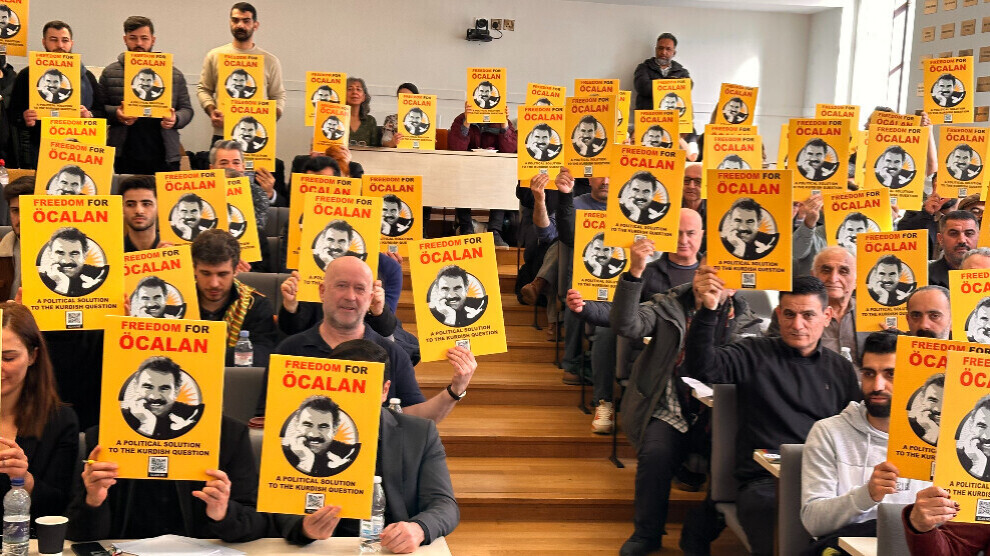UK unions: Öcalan's message is a call for dialogue
The Freedom for Öcalan UK Trade Union Campaign said it stands in solidarity with the Kurdish people and demands an end to Turkey’s attack on local democracy.
The Freedom for Öcalan UK Trade Union Campaign said it stands in solidarity with the Kurdish people and demands an end to Turkey’s attack on local democracy.

The Freedom for Öcalan UK Trade Union Campaign issued a statement in solidarity with the Kurdish people at a time when they once again have to fight against the appointment of trustees to the municipalities democratically and legally won by the DEM Party.
The UK trade unions said in their statement that they "have a long-standing history of standing in solidarity with oppressed peoples worldwide and advocating for justice. For years, the movement has been actively involved in the Freedom for Öcalan campaign, launched in 2016 by UNITE and GMB, and now supported by 14 major trade unions and the Trade Unions Congress (TUC). Through this campaign, we have consistently called for the release of Abdullah Öcalan and for a peaceful, democratic resolution to the Kurdish issue."
The statement added: "The Turkish government continues a systematic policy of repression on Kurdish communities and their democratic institutions. Recent actions, including the forced removal of elected Kurdish mayors and the imposition of trustees, are blatant attempts to suppress democratic rights and undermine local governance.
In the past week, the Turkish government replaced elected mayors in Mardin, Batman, and Halfeti with state-appointed trustees. These actions are part of a broader pattern of systematically disregarding local democracy and imposing authoritarian control. The removal of these officials — many elected with overwhelming support — highlights Turkey's continued efforts to repress the Kurdish political movement."
The statement continued: "While Turkish leaders, including President Erdoğan and his ally Devlet Bahçeli, have recently suggested a potential openness to dialogue to resolve the Kurdish issue, these overtures are contradicted by Turkish military operations in Rojava (Northern Syria), which continue to target innocent civilians and the broader infrastructure network providing resources to the local peoples. Turkish military activities reveal a stark contradiction between the state’s rhetorical commitment to peace and its actions, which undermine any hopes for genuine dialogue or a peaceful resolution.
However, one recent development offers a glimmer of hope. On 23 October, Abdullah Öcalan's nephew, Ömer Öcalan, visited him in prison — the first contact in years. During the visit, Öcalan delivered a clear message of readiness for dialogue, emphasising his commitment to resolving the Kurdish issue through legal and political frameworks. This message must not be ignored: Öcalan has consistently advocated for a peaceful resolution within Turkey's framework and is ready to play a key role in any such process."
The trade unions said that "Öcalan's message is a call for reason and dialogue, one that should be heeded by both Turkey and the international community. His insistence on a solution based on legal and political frameworks, rather than violence and military repression, offers hope to millions of Kurds in Turkey and beyond. Despite years of isolation, Öcalan remains committed to a peaceful resolution of the Kurdish issue," and added that "the Turkish government must demonstrate its commitment to dialogue by halting military aggression, ceasing the removal of elected officials, and respecting the democratic rights of the Kurdish people. The international community, including the United Kingdom, the European Union, and the United Nations, must support efforts to bring about a peaceful, democratic solution to the Kurdish issue in Turkey."
The Freedom for Ocalan UK Trade Union Campaign, demanded: "The immediate reinstatement of elected Kurdish mayors in Mardin, Batman, Halfeti, and other affected municipalities, and an end to the imposition of trustees that bypass the democratic will of the people; The immediate release of Abdullah Öcalan from isolation, allowing him to play a central role in any future peace process and contribute to negotiations to resolve the Kurdish issue; A cessation of Turkey’s military operations in Rojava and a halt to the violence against Kurdish-led forces and civilian populations in Syria; Respect for the democratic rights of the Kurdish people, both in Turkey and the broader region, including the right to elect their representatives and engage in peaceful political activities without fear of arrest or repression; International pressure on Turkey to engage in meaningful dialogue with Kurdish representatives and other political groups to find a peaceful, democratic, and sustainable solution to the Kurdish question."